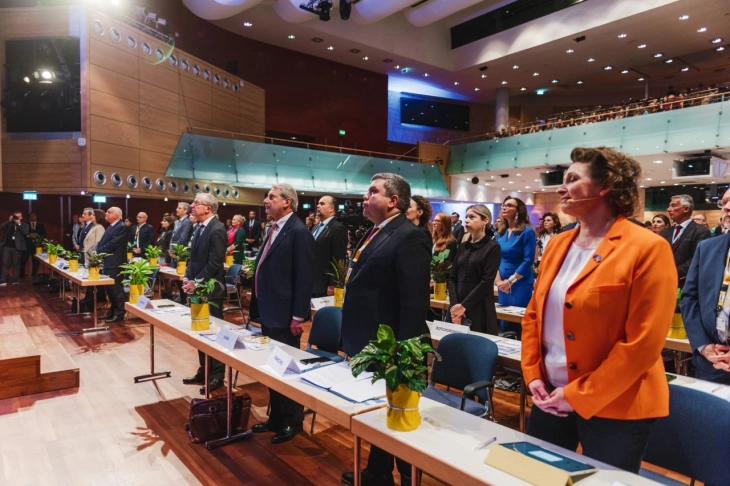EU needs clear plan and strategy for enlargement, says Marichikj in Salzburg

Skopje, 24 October 2022 (MIA) – Deputy PM for European Affairs Bojan Marichikj told Monday’s panel discussion “Will Europe survive its Crises?” within the 18th Salzburg Europe Summit that only united, with clear plan and strategy, the EU will succeed in overcoming the challenges it is currently facing.
“The new reality that we and the EU are living in, requires concrete steps and decisions that will make us more united and take us forward. Only with the right decisions and a clear strategic plan for enlargement will the European Union overcome the current challenges,” Marichikj said.
At the panel, a debate was opened on the credibility of the EU and its influence in the Western Balkan countries, particularly in recent years, as a consequence of the passivity of the enlargement policy, to which Marichikj said that the trust of the citizens in the Union is the most important and work must be done to restore it, stressing that polls speak of a drop in support for North Macedonia's EU membership and there is disbelief that the country will become a member at any moment, the Secretariat for European Affairs said in a press release.
Federal Minister for the EU and Constitution of Austria Karoline Edtstadler said enlargement is not a matter of speed, but of the credibility of the EU, adding that for a long time the policy of enlargement has been kept aside, and stressing that Austria remains a supporter of the integration of the Western Balkan countries in the EU.
Federal Chancellor of Austria Karl Nehammer said the step taken by North Macedonia and the start of negotiations with the Union is highly respected and welcomed.
“We are the bridge with the Western Balkans, and we need to commit to it even more intensively. There must be progress in the countries of the region. It will be a long process, but we have to prove to them that we are interested in them,” Nehammer said.
Deputy PM Marichikj also spoke about the importance of NATO membership, which is confirmed in these times of war on the soil of Europe and when countries like Finland and the Kingdom of Sweden are waiting to become part of the largest military alliance.
“We made great sacrifice for the NATO membership and reaffirmed our sincere intention and commitment in fulfilling the strategic goals of the country. We have shown that we are also a credible partner of the EU with hundred percent alignment with the EU's foreign policy. Now we also expect the EU to be the first in to give support in dealing with the crises,” said Marichikj.
Marichikj pointed out that the only option for the country is the Union, which still remains the best peace, political and economic project for the entire continent.
“We have no better option. It is still a peace project, otherwise we would not be asking today the question whether Ukraine should be part of the European Union. The Western Balkans was also a turbulent region. But joining the EU will seal the topic of our prosperity, security and stability,” the Deputy PM added.
Deputy PM Marichikj addressed the panel alongside Vice-President of the European Parliament Nicola Beer, Secretary General of the Austrian Foreign Ministry Peter Launsky-Tieffenthal, Vice-President of the European Investment Bank EIB Lilyana Pavlova, and State Secretary for European Affairs and International Law of the Republic of Slovenia Marko Štucin.
On the sidelines of the summit, Marichikj met with EU Commissioner for Budget and Administration Johannes Hahn, Secretary General of the Austrian Foreign Ministry Launsky-Tieffenthal, and Director of EU Funds Autonomous Province of Vojvodina, Serbia, Aleksandar Simurdic.
The 18. Salzburg Europe Summit taking place Oct. 23-25, 2022, is held under the auspices of President of Austria Alexander Van der Bellen and Federal Chancellor of Austria Karl Nehammer. This year the summit is held under the theme Europe and Peace, Visions for Europe: Expectations and Reality.







